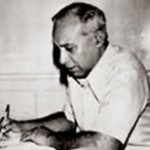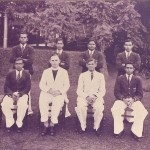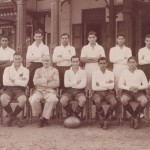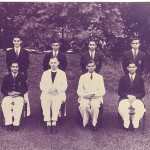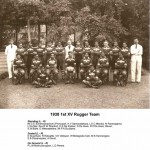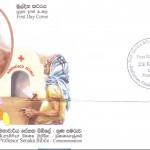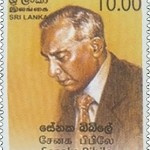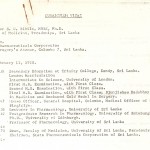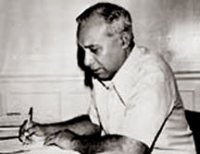 Prof. (Dr.) Senaka Bibile (1920-1977) was a third generation Trinitian. His father C.W. Bibile (1894-1936) and grandfather (W.R. Bibile 1865-1918) too attended Trinity. The family, descending from a long line of Veddah Chieftains and Kandyan Chieftains in the Uva Region, saw the benefits of a liberal education and enrolled their children at Trinity from the very inception of that hallowed institution.
Prof. (Dr.) Senaka Bibile (1920-1977) was a third generation Trinitian. His father C.W. Bibile (1894-1936) and grandfather (W.R. Bibile 1865-1918) too attended Trinity. The family, descending from a long line of Veddah Chieftains and Kandyan Chieftains in the Uva Region, saw the benefits of a liberal education and enrolled their children at Trinity from the very inception of that hallowed institution.
At Trinity, Senaka was an all rounder and shone at sports, academics, and extracurricular activities. He won his Rugby colours as well as many prizes for science and biology. He was a prefect and a cadet. He played the lead role in several school dramas, and exhibited his talents in acting, dancing, and singing, and also played the guitar and the piano accordion.
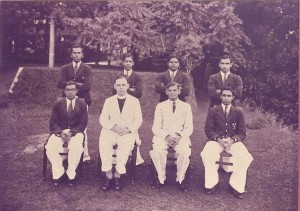
Senaka Bibile Rugby Colours Front Row Right Senior Year. Principal Rev. Robert Stopford seated in the middle.
It was his voluntary work with the Social Service Union at Trinity with its unique and long standing outreach programs and clinics for the slum-dwellers of Mahaiyawa that gave him an insight into another world, far removed from a privileged life in his ancestral Walauwa at Bibile and Alison House at Trinity. During school holidays he also accompanied his father, the Rate Mahattaya of Bibile-Wellassa, on official circuit by bullock cart and foot to remote and roadless villages in that region, where he was exposed to rural poverty and ill health. The experiences with city slum dwellers and the rural poor made a lasting impression on his young mind, with far reaching consequences for the good. He saw the link between ignorance, ill health, and poverty. Thus began his lifelong dedication to social justice and health care; and he aspired to be a doctor. Sadly, at the height of his school career in 1936, tragedy struck. His father, C.W Bibile died at the young age of 42. Though the family had ancestral village lands, without the government salary earned by the father, economic circumstances changed abruptly. As the eldest of six school-going children, school fees were no longer affordable and he decided to leave Trinity to seek employment. But the visionary principal at the time, the Rev. Robert Stopford (who later became the Bishop of London) would not hear of it. He searched for a benefactor and found an old boy who saw the promise Senaka displayed and agreed to help. Though this benefactor wished to remain anonymous at the time, it emerged later that it was D.B Ellepola, and that should be recognized. Senaka was to do the benefactor and Rev. Stopford proud, at Trinity, at Medical College, and in the larger world. In his final year at Trinity he won the Fraser Scholarship.
Entering the Ceylon Medical College with no funds, Senaka had to top the batch each and every year to win the one scholarship on offer. That sufficed only to pay the university fees. At his dingy ‘digs’ in Borella he had to wash dishes and clean the drains to pay for his frugal meals and bed. During this time the family of Dr. Lloyd Abeyratne befriended him and became his surrogate family, his own mother and siblings being far away in Bibile, then a 2 day journey from Colombo. In the midst of all the examination pressures and financial worries he played Rugby for the University team and took part in various extra-curricular activities. Yet, his academic achievements did not suffer, and they speak for themselves: He completed his First, Second, and Final M.B. Examinations, all with First Class Honours and won the coveted Djunjishaw Dadabhoy Gold Medal in Medicine and the Rockwood Gold Medal in Surgery at the finals.
Later he obtained his Ph.D from the University of Edinburgh, was the first Professor of Pharmacology in Colombo, and Dean of the Medical Faculty in Peradeniya. During this time he formulated the innovative rational drugs policy and set up the Pharmaceutical Corporation, better known as Osu Sala. It was this pioneering work that carried him into the international sphere, working for the UN Conference on Trade and Development (UNCTAD) in conjunction with the World Health Organisation, setting up rational drugs policies in developing countries. Canada too has now adopted the generic prescription of drugs which was first formulated in Sri Lanka by Prof. Senaka Bibile in the 1970s. The Health Action International newsletter of April 1990, published by the International Organization of Consumer Unions (IOCU) stated that –
Singlehandedly he conceived, formulated, developed and implemented a people’s oriented drug policy in Sri Lanka in the early 1970s. The pharmaceutical reforms initiated in Sri Lanka by Bibile have been transformed into a global action programme. During the 35th World Health Assembly in Geneva in May 1982, a senior WHO official stated, ” … the philosophy guiding WHO’s Action Programme on Essential Drugs is based on that recommended by the late Professor Bibile of Sri Lanka.
The IOCU raised funds to set up a Senaka Bibile Memorial Scholarship at the Medical Faculty in Colombo, and also his family has committed funds and is raising additional funds to set up another memorial scholarship at the Medical Faculty in Peradeniya in 2012.
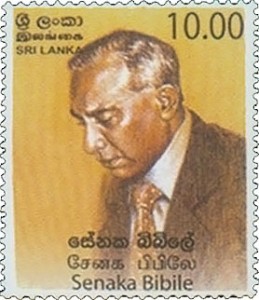
In recognition of his international stature, the Sri Lanka Government issued a Senaka Bibile Commemorative Postage Stamp in September 2006.
Article Written By Ranil Bibile (Son of Prof. Senaka Bibile)
Related Posts:
Published 13 years ago by Ranil Bibile

